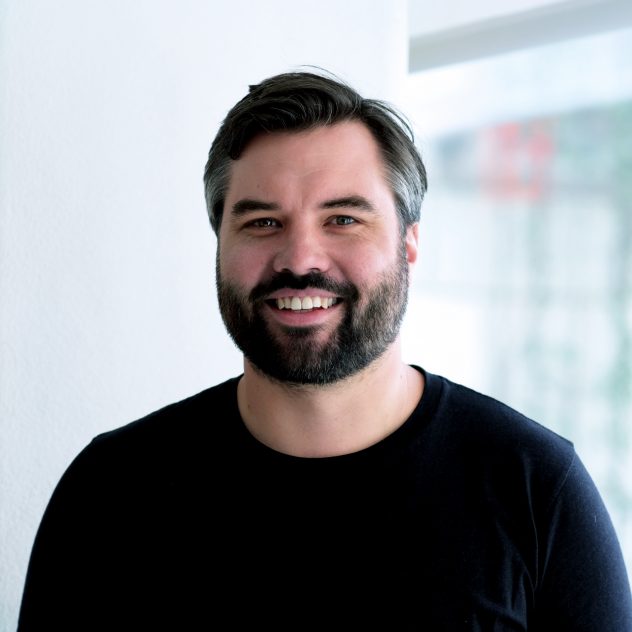
Shane Woods speaks about his work at a tech start-up that aims to give researchers access to vital data on routine cancer care.
There is such potential for research if we can collect meaningful data at scale from routine clinical care and put it in the hands of academics and biopharmaceutical companies.
Shane Woods
Since he left Cambridge University in 2008, Shane Woods has replayed in his mind a particular speech by former Gates Cambridge Provost Gordon Johnson. It was about leadership and the importance of taking your experience back to your country on graduation and making a contribution.
Shane [2004] had long been looking for a role which would combine the passion he has for science with large-scale impact. He feels that he has found that in his current role as Vice President of Life Sciences at Flatiron Health, a healthcare technology company focused on accelerating cancer research and improving patient care through the use of “real-world” data.
Less than 5% of cancer patients are enrolled in clinical trials in the US. That means, says Shane, that we’re not learning from the other 95% of cancer patients’ treatment and outcomes. He states: “This is the promise of real-world data – that widescale clinical data could be collected and used to improve outcomes for other patients. There is such potential for research if we can collect meaningful data at scale from routine clinical care and put it in the hands of academics and biopharmaceutical companies.”
Health records in the US have been increasingly digitised through the adoption of Electronic Health Records since around 2009, but Shane says that what many don’t realise is that much of the rich clinical information remains trapped as unstructured data and in a non-standard form. Flatiron Health is working to structure and standardise this information at scale so it can be useful for researchers. “The aim is for researchers to be able to access thousands of patients’ treatment and outcomes with a click on their keyboard,” says Shane.
“Currently, we are trying to hone in on the quality of the data and map different levels of evidence to the appropriate application, for instance, design better clinical trials or support regulatory filings,” says Shane, adding that the potential, for instance, for longitudinal studies, is huge. “The impact we could have on patient care is remarkable,” he says. He cites the case of a particular type of metastatic breast cancer. He says a doctor may have seen just a handful of similar cases in the past and base a treatment decision on anecdotal experience, whereas meaningful data from thousands of patients could help close the evidence gap in selecting the optimal treatment. “We are harnessing the power, and in a sense the variability, of routine clinical care,” says Shane.
Early years
His career trajectory has not been linear, but his desire to have an impact was always clear and was honed during his time at Cambridge.
 Shane [pictured right] was born in Toronto and his first experience with clinical research was at Toronto General Hospital where his mother worked as a nurse. He did two internships there in his first two years of university, studying patients with congenital heart defects. He directly interacted with these patients, as part of a study, through data collection. That meant he was able to see at first hand the individuals who might benefit from any findings. “I could put a face to the work,” he says. “It gave me a real taste of clinical research and the connection to the patient and that has stuck with me ever since. That has been the overarching theme of my career after leaving academia.”
Shane [pictured right] was born in Toronto and his first experience with clinical research was at Toronto General Hospital where his mother worked as a nurse. He did two internships there in his first two years of university, studying patients with congenital heart defects. He directly interacted with these patients, as part of a study, through data collection. That meant he was able to see at first hand the individuals who might benefit from any findings. “I could put a face to the work,” he says. “It gave me a real taste of clinical research and the connection to the patient and that has stuck with me ever since. That has been the overarching theme of my career after leaving academia.”
When he left high school, however, he was unsure what he wanted to do. He applied to study Engineering and Biochemistry at Queen’s University in Canada and ended up going down the biological science route. He was able to get involved in lab work and spent a year in the US working with Dr Tim Mitchison at Harvard Medical School doing early drug development and with Dr Ted Hinchcliffe at Notre Dame University in cancer biology. Both became mentors and his work with them provided a stepping stone to his doctoral studies.
Research
Dr Mitchison suggested he apply to the UK for his PhD. Shane applied to Julie Ahringer’s laboratory at Cambridge’s Gurdon Institute. He was interested in exploring the prevailing dogma that biological systems have certain redundant functions, such as back-ups or duplicates of genes. For Shane, this didn’t make sense. “Population genetics models tell us it should not be the case that biological systems operate in the same way as an engineering model. I wanted to directly test that theory,” he says. He put his “blood, sweat and tears” into his research, with the pinnacle being publication of the results. These suggested that non-essential genes are highly over-represented among duplicates and that duplicate gene pairs derived from essential and non-essential genes have contrasting evolutionary dynamics: whereas non-essential genes are both more often successfully duplicated and lost, essential genes are less often duplicated, but upon successful duplication are maintained over longer periods.
Shane recalls orientation with Gordon Johnson telling scholars around a campfire that Cambridge is a place of many circles or networks of people. “He said you will have the opportunity to engage in lots of these circles and that Gates Cambridge was one of those circles,” says Shane. He took that advice to heart and was active in university sports – he was captain of the university ice hockey team – in his faculty, at his college and in the Gates Cambridge community, being on the welcoming committee for orientation.
After he finished his PhD Shane says he felt in part unsatisfied as there was a realisation that his findings would only affect a handful of academics invested in the field. He says that realisation was a lesson in itself. “I realised that impact was really important to me. By the end of my time at Cambridge I was very certain of where I wanted to go,” says Shane.
From consultancy to tech start-up
He took a job at Insight, a boutique life sciences consulting firm in New York City, which allowed him to draw on his academic skills and to develop his knowledge of the business side of science. Shane worked for biopharma companies across different therapeutic areas. Within around a year he decided that he wanted to specialise in oncology due to close family experience, his previous research experience, the fast pace of progress in the field, the huge unmet need for effective treatments and the scale of potential impact.
Shane stayed at Insight for five years and says that, although the problems his clients faced were always interesting, he didn’t see himself working in such large, bureaucratic organisations. Also, while he was developing the companies’ strategy with them, his involvement always ended prior to execution, so never involved understanding how that strategy had panned out. “I felt I was missing out on the impact of the strategy,” he says.
Through Insight he heard about Flatiron Health, a tech start-up in New York City run by ex-Google employees which had around 50 employees at the time. He was intrigued with how the multiplier effect of software could be applied in the health sector. Shane was invited to lead the company’s life sciences business. It was a risky step in his career, but he relished working towards the company’s ambitious goals to accelerate research into effective cancer treatments.
Since Shane joined six years ago, the company has grown rapidly. It now has over 2,500 employees and was acquired just over two years ago by Roche, something Shane describes as a validation of the work they are doing and their investment in patient care and cancer research.
Impact
The potential impact of this work has really excited him. “I have found my place and it’s in the start-up space. Its nimble operating models are primed for innovation,” he says. “It’s high risk, but the potential for impact is great. At Flatiron it’s still early days as we are in the infancy of where this could ultimately go.”
He adds that his experience at Cambridge and Gates Cambridge in particular came at a crucial time in his career. “When I arrived I had no idea that making a living could be combined with doing something I was passionate about. Gordon Johnson’s words and engaging with the “circle” of scholars from such a diversity of backgrounds and perspectives from around the world crystallised something for me. At Flatiron it is very cross-disciplinary. An oncologist sits next to a software engineer. The two would normally never meet. At Cambridge I was exposed to scholars and, despite being from other disciplines, we had to learn how to communicate our research to one another. The aperture opened for me at Cambridge – the experiment to mix disciplines in unorthodox ways – and has led to the opportunity to do something really exciting.”
*Picture credit: Defense Advanced Research Projects Agency (DARPA)












